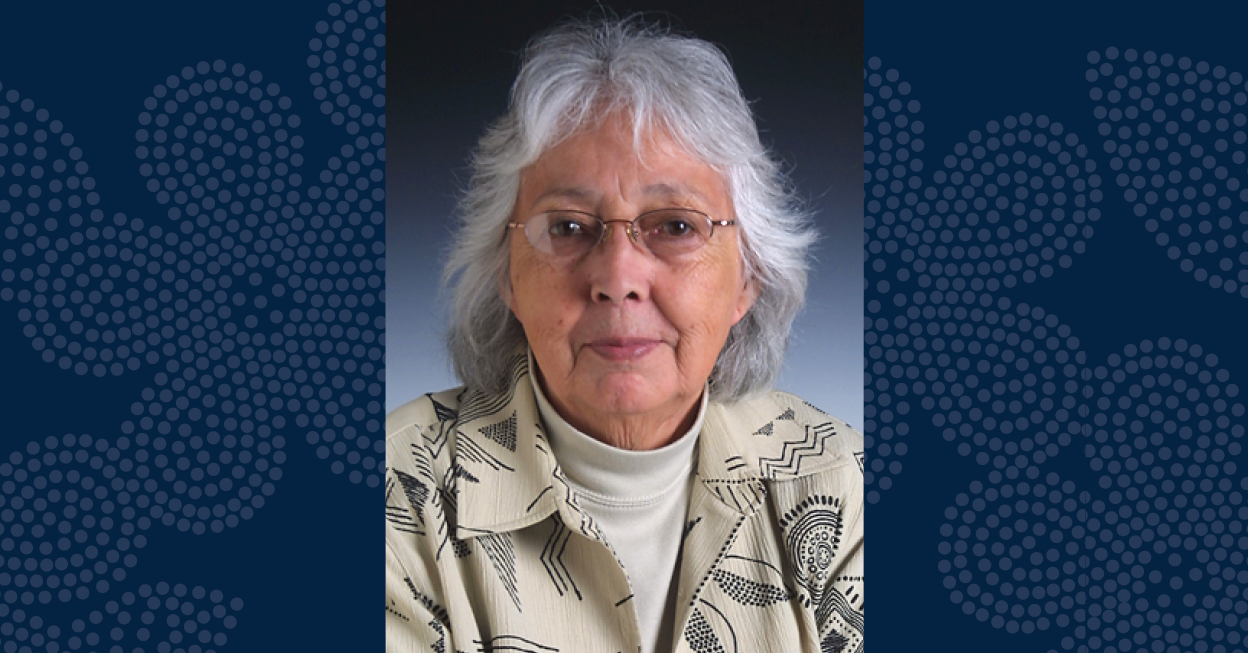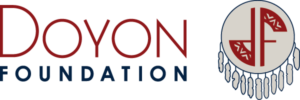
Born in the community of Holikachuk on the north bank of the Innoko River in west-central Alaska, Elizabeth Keating is an Elder taking part in Doyon Languages Online, a Doyon Foundation project that develops online language learning for nine of the 10 Alaska Native languages of the Doyon region.
Elizabeth’s ancestors include parents Louise (Andre) and Paul Keating, and grandparents Chief and Lizzie Alexie. Elizabeth writes that names of other family members were lost when self-assigned names of Alaska Native people were converted to English. Many substitutions were in place by the early 1900s.
Holikachuk is an Athabascan language intermediate between Deg Xinag and Denaakk’e (Koyukon). It is Elizabeth’s first language, spoken to her by the grandparents who raised her from birth. Holikachuk is among Alaska Native endangered languages at risk of falling out of use as speakers age or switch to another language.
“My language makes me who I am on all levels of being,” Elizabeth says. “It affects how and what I think about life and the world around me.”
Early photos depict the community of Holikachuk as a collection of log buildings amid low hills, tall grass and muskeg bogs. Anthropologists working from stone tools found in the area believe that people have dwelled at Holikachuk since prehistoric times despite regular springtime flooding. In 1963 residents voted to move west to Grayling on the Yukon River, where king salmon runs and regular barge visits helped support a community.
Today Elizabeth contributes to language revitalization by recording words in Holikachuk for Doyon Languages Online. The project is a partnership between Doyon Foundation and 7000 Languages, a nonprofit supporting endangered language learning through software donated by Transparent Language. The Foundation released a Holikachuk course as part of the Doyon Languages Online launch this summer. The course, along with courses in Gwich’in, Denaakk’e and Benhti Kenaga’, is now available at no charge to all interested language learners through the Doyon Foundation website.
Recording in Holikachuk is challenging. “I lost the use of my language except for some words and phrases,” says Elizabeth, who lives in Anchorage. “I am relearning. There are no fluent speakers of Holikachuk left, so the work of recording is critical.”
“I truly appreciate Doyon Foundation for getting grants to do this work. I appreciate the patience and understanding of everyone with Doyon Languages Online.”
Doyon Languages Online is engaging: Photos, videos and hints are available, and learning is reinforced with explanations of grammar and culture. Each segment undergoes full review by speakers, linguists, and the staffs of Doyon Foundation and 7000 Languages.
“My grandparents did not speak English,” Elizabeth recalls. Her father, whom she saw often but did not live with, spoke only English and so Elizabeth learned English too. Living in two languages was a kind of balancing act.
These days, she’s semi-retired and eager to teach her language. She has posted phrases on a private Facebook site for Grayling/ Holikachuk and offered to teach a language-learning class at Loussac Library in Anchorage.
“I make myself available to anyone who’s interested,” she says. “It’s a big concern to me that we no longer have fluent speakers left. I know effort is being made at the village level; I hope more will be done.”
Doyon Languages Online is developing introductory online lessons for Benhti Kokhut’ana Kenaga’ (Lower Tanana), Deg Xinag, Denaakk’e (Koyukon), Dihthaad Xt’een Iin Aanděeg’ (Tanacross), Dinak’i (Upper Kuskokwim), Dinjii Zhuh K’yaa (Gwich’in), Hän, Holikachuk, and Nee’aanèegn’ (Upper Tanana).
Doyon Languages Online is funded by a three-year grant from the Administration for Native Americans (ANA), awarded in 2016, and an additional three-year grant from the Alaska Native Education Program (ANEP), awarded in 2017.
As Doyon Foundation continues to grow our language revitalization efforts in the Doyon region, we would like to recognize people who are committed to learning and perpetuating their ancestral language. We are pleased to share some of these “Language Champion” profiles with you. If you know a language champion, please nominate him or her by contacting our language program director at [email protected]. Language champions may also complete our profile questionnaire here. You may learn more about our language revitalization program on our website.
